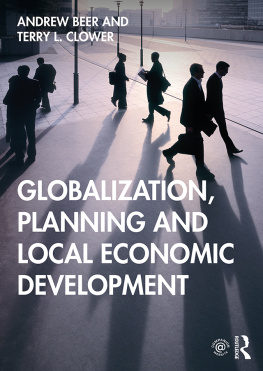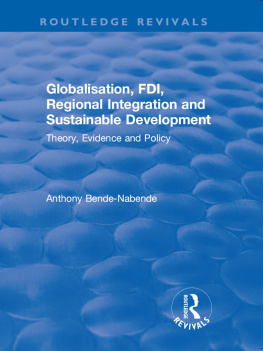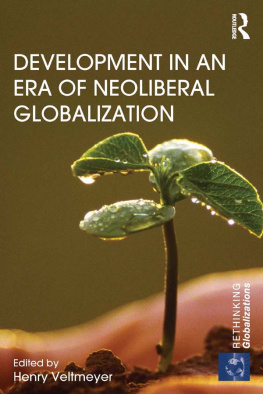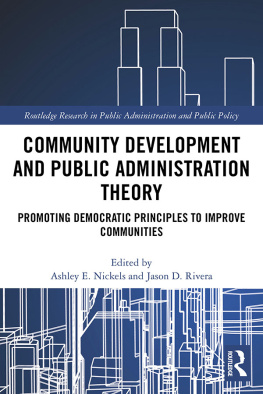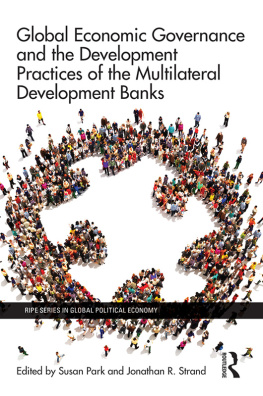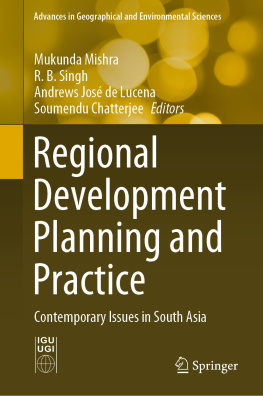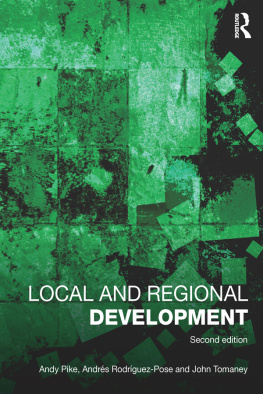Thanks go to the many people, organizations and institutions that helped make the writing of this book possible. Andrew Beer was able to spend a substantial period of time on this monograph thanks to study leave when he worked at the University of Adelaide. Thanks have to go to Julie Clower and Christine Steele who put up with the two of us launching into detailed discussions about the book at apparently random points in time in all the oddest places.
Conversations with economic development practitioners, town planners, consultants, academics and government officials were crucial to the evolution of this book. Thanks go to Professor Phil McCann for his ideas on what the book could and should look like, and as always his insights were both profound and welcome. We acknowledge the hospitality and support of our colleagues Dennis Clayton at the City of Weatherford, Kristine Peters at KPPM Project Management and the Hallett Community and Sports Association, Anne Moroney at the Barossa Regional Development Australia Committee, Greg Ratsch from the City of Salisbury, Peter Tregilgas from the Mid North Coast Regional Development Australia Committee and many others working in the profession.
Special thanks go to our colleagues at the University of Adelaide, the University of North Texas, George Mason University and the University of South Australia, including Lisa Gage and Louise OLoughlin. They helped with the creation of figures and tables, while other colleagues provided helpful commentary on the manuscript. Thank you to Sandy Horne who played such an important role in the finalization of the manuscript. As always, we are both grateful to her for her professionalism, attention to detail and inquiring mind. Many thanks go to Professor Marie Wilson for allowing Andrew Beer the time to complete this work.
- ABS Australian Bureau of Statistics
- AI Artificial intelligence
- BID Business improvement district
- CEDS Comprehensive economic development strategy
- CGE Computable general equilibrium
- EDA Economic development administration
- EU European Union
- FDI Foreign direct investment
- GDP Gross domestic product
- GSP Gross state product
- ICT Information and communication technologies
- MEP Manufacturing extension program
- NAFTA North American Free Trade Agreement
- NRP New rural paradigm
- o ECD Organisation for Economic Co-operation and Development
- R&D Research and development
- SBDC Small Business Development Center
- SREDC San Diego Regional Economic Development Corporation
- TIF Tax increment financing
- UCSD University of California San Diego
This chapter:
- Addresses why cities, regions and communities need to take active measures to plan for their future economy;
- Reviews the arguments that both support and oppose efforts to develop locally or regionally;
- Argues there is now a substantial body of evidence on what is effective, and what is not effective, in local economic development;
- Notes the range of strategies potentially available to encourage growth locally and that the globalization of the economy has generated new opportunities for many communities, and that this should provide a further spur for action.
WE ALL LIVE, work and enjoy ourselves in a city, a town, a village or a region. Increasingly these places are confronted by social, technological, demographic and political developments that have transformed their economic base and raised questions about the ongoing prosperity of many. In many cities and communities the established economic order has been challenged by a suite of changes, including the shift amongst economically advanced nations from a reliance upon manufacturing employment to jobs based on sendees; the rise of China as an economic and technological superpower; the global economic crisis in 2007-2008 and the resulting legacy of sluggish growth in many regions and communities; the liberalization of trade between nations; growing questions of environmental sustainability at the regional and global scales; and the aging of the workforce.
Governments have struggled to find strategies to ensure the prosperity of all parts of the nation in the face of change that is beyond their control. Increasingly there has been a fracturing of economic well-being and growth at the national scale, with some places adjusting to the new economic opportunities more rapidly than others. This has meant that as individuals, our quality of life and economic prospects are now more influenced than in the past by the prosperity and physical resources offered by the places in which we live. Indeed, Richard Florida (2008) has argued that the rise of the creative economy means that where you live is now one of the most important decisions in your life: shaping your job opportunities, lifetime earnings and the quality of your environment. Localities with strong economies, good infrastructure and burgeoning industries are more likely to offer their residents high levels of amenity, rising incomes and secure employment. By contrast, cities, communities and towns suffering from the decline of important employment sectors are less likely to attract investment, they find it more difficult to develop and sustain appropriate infrastructure and they are more likely to lose population and influence when compared with more prosperous regions.
Places cities, regions, towns and other, smaller, settlements therefore matter (OECD 2009). They are important to the individual, the household, the community and as will be argued later the nation as a whole. There are no truly wealthy nations comprised entirely of poor regions and towns and, as the OECD (2012a p 15) observes, very underdeveloped regions can often impose high costs on national budgets. This book sets out to shed light on three things: first, it examines why governments, communities, elected officials and professional staff in town planning, city management and national, state and local governments need to pay close attention to the economies of their regions, towns and cities. Second, Globalization, Planning and Local Development sets out to provide the concepts and knowledge needed to successfully navigate current thinking around growth and how and why these economic drivers are shaping the prospects of regions and cities. Third, and perhaps most importantly, in this book we document the strategies and actions available to communities and regions as they plan for a better future.
Communities across the globe are confronted by a fundamental question: why should we plan for economic development when national governments already give the issue a great deal of attention, and we know that globalization means many of the decisions affecting growth are taken outside the region, and commonly in other countries? Surely, given the fundamental dynamics of the economy, comparable development would take place locally if no action was taken?
These are critical challenges and it is important to acknowledge that some communities and local governments do not prioritize economic growth and instead emphasize other issues, such as meeting social needs, ensuring the protection of the environment or building a sense of community. While each of these other aspects of social and economic well-being is important, and deserving of local action, engaging with questions of economic development at the city, region or community level is crucial for four major reasons:
- First, economic development empowers a community to shape its future. It provides greater choice with respect to pathways for future development, it can enable the emergence of a better-educated and more skilled population and it can provide the resources needed to reduce adverse impacts on the environment, while continuing to enjoy greater prosperity.

